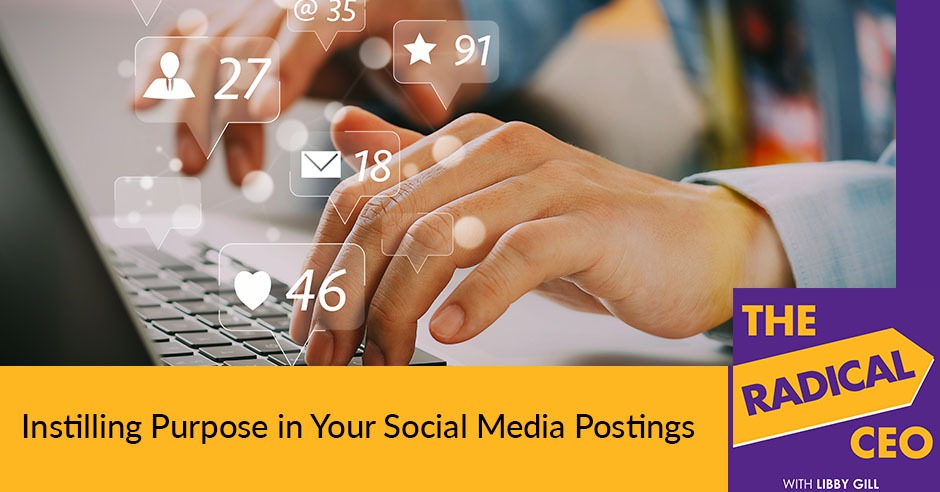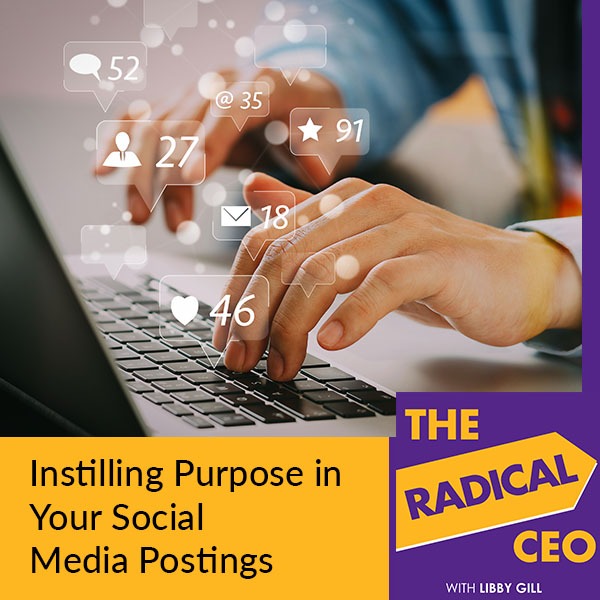
The Internet greatly affects the way we manage our daily lives—from how we communicate and shop to who and what we believe. With our dependence on the web, those of us who are content providers or social media influencers have an obligation to our audiences. Today, Libby Gill talks to business and sales strategist John Golden, who is the publisher of Sales POP magazine and podcast, a bestselling author, and the chief marketing and strategy officer for Pipeliner—a customer relationship management tool (CRM). He opens our eyes to how we can add more value by instilling our social media with a sense of purpose. Author of Winning the Battle of Sales, John connects his love of military history to sales success.
—
Watch the episode here:
Listen to the podcast here:
[smart_track_player url=”https://www.podetize.com/statsapi/www.podetize.com/wp-content/uploads/fileuploads/11-5b145ef137b51b3d1af0633e9305c43d/02/2020/139dcedef2b0c13f17c4962b58edcdad.mp3″ title=”Instilling Purpose in Your Social Media Postings With John Golden”]
Instilling Purpose in Your Social Media Postings With John Golden
My guest is an interesting guy I had the pleasure to meet a little while back. Honestly, he’s a bit hard to describe because he’s a Renaissance man. John Golden is a business and sales strategist, a magazine and podcast publisher, a bestselling author and the Chief Marketing and Strategy Officer for Pipeliner, which is a CRM, a Customer Relationship Management tool. In his spare time, he is an avid martial artist. John is a prolific writer and publisher. You can find his written and audio content at SalesPop.net. Even though he’s written this cool book called Social Upheaval: How to Win @ Social Selling, he’s got some pretty contrarian views about social media. If you know me, I love a naysayer. I’m going to read you a couple of his statements, “Twitter may force brevity, but a torrent of pithiness taken in the aggregate can still become a lot of noise. When do we cross over into saying far too much when we have so little to say?” Finally, “Are any of us listening or are we too busy communicating?” Welcome, John with that set-up about being a prime contrarian. Is it true?
I do think it’s true because one of the things that happened is, we went through this change of selling and everybody was told, “You’ve got to get online and build your brand. You’ve got to get out there and you’ve got to publish content.” To be perfectly honest, there’s an awful lot of people who don’t do it in a thoughtful manner who think it’s all about quantity and not quality. I had this conversation with somebody, I said, “If everybody is a publisher, who’s the consumer? Who’s got time to consume?” When I say about value is there’s a lot of people out there who look and say, “This needs to be 500 words in order to be ranked on the SEO. Therefore, I’m going to write 500 words,” when my idea could be delivered in two sentences or none at all.
[bctt tweet=”We need to let go of recreational anger.” username=”LibbyGill”]
We need to bring back some thoughtfulness because everybody says. “We’re the busiest we’ve ever been. I’ve never been so busy before.” I always and/or, “Are you more distracted than ever? Are you spending half of your day tweeting and re-tweeting or posting on LinkedIn or updating your Instagram? What is that doing for you?” You have to ask yourself the value of these things. I’m not saying don’t do them. I’m saying like anything else in your life, ask yourself what the purpose of it is and what outcome am I looking for? If you can’t number figure out the purpose and you can’t in some way measure the outcome of it, you’ve got to be questioning why you’re doing it.
We’ve gone past that what I had for breakfast and people know that’s a no-no except on Instagram where you can post your doughnuts. If everybody’s writing and pushing this out, who’s taking the time to read? That’s how what I value is if I read something repeatedly, if it’s, “This podcast, I will always listen to. This newsletter, I will always read.” Aren’t that many of them that are relevant?
That’s what started to happen. We’re naturally starting to filter out all of this stuff and we are going back. I would challenge people. Ask yourself two or three podcasts that you will listen to fairly regularly. There’s a couple of sites you have visits. Look at your newest consumption, there are a couple of sites you visit every day and you disregard the rest. When you’re creating content, you have to ask yourself, why would I be on that small list every day?
It’s a tough question to answer. It’s also so much about finding your tribe. It’s finding people that care and not worrying about anybody else because those are going to be regular audiences.
That’s another great point because everybody got this idea of, “Build a huge audience. Go after a huge audience.” No. Find your tribe, find your target audience. If it’s a small audience in some ways, that’s better.

It’s hard for myself or anybody else, but I always coach people. I’m sure you did narrow the niche and people are so scared they’re going to lose everybody else out there. It can be hard. Especially when entrepreneurs are starting or anybody in their career is starting out, you want to be seen as I can do it all and you get more and more specialized over time. John, let’s back up a little bit. You were not from California where you live. Tell us a little bit about your background and how you ended up in the States and your career path.
I’m originally from Ireland from the Southside of Dublin. I have a much softer accent than most people in Ireland and people from the other side of Dublin. Sometimes people will go, “You have an accent, but you don’t sound like other Irish people.” I say, “Yes, we have a slightly softer accent.” It was back in the ’90s. I worked for a startup company in Dublin called CBT Systems, who were pioneers in computer-based training. At that time, they’re one of the first ones. A lot of it was done on CD ROMs and all of that stuff. They opened an office in Silicon Valley during the dotcom era. In the mid-’90s, around 1996, I started traveling over to Silicon Valley from the development center to liaise with the sales and marketing side of the house. They asked me to come over. I moved over here permanently around ‘97 or ‘98. My first experience of living in the United States is quite a blessing. I lived up in the city in San Francisco. I worked down in Silicon Valley in the dotcom. The great thing is I parachuted into a very strange world that was contained in a bubble. It wasn’t the rest of America. It was insane.
Companies were popping up dotcoms every day and people you heard of like, “That twenty-year-old. He’s now a multi-millionaire because of the stock option. Two years later, he was back on his mom’s house.” I lived through that. I was there as it ramped up and it went crazy. I was there when it imploded. The implosion was quite dramatic and it was overnight. You see the signs coming down. Car parks are empty. Suddenly my commute to work was halved. I was like, “Where’d everybody go?” The company existed for a while. It was sold on and I moved on. I worked for a company in Orange County, New Horizons Computer Learning Centers. I was at the franchisor. That was an interesting experience working with a franchise network when you’re the big bad franchisor. That’s a great way of toughening you up. I went to another startup in the K-12 education online training space.
[bctt tweet=”Bring a bit of perspective before you get angry or outraged about something and start popping off on social media.” username=”LibbyGill”]
You’re always been in the training and education side of sales.
Yes, to some degree. I got this phenomenal opportunity to take over the CEO of Huthwaite, which was SPIN Selling, Neil Rackham’s famous book. It was owned by a company called Inform in the UK who owned a ton of businesses. They will appoint you as the CEO of one of their businesses and let you run it as if it was your business. As long as you hit the targets every year, you run it however you choose to run it. It was like being given your own company without having to build it yourself and finance it. I ran that for 6 or 7 years and I run another company at the same time. That was great because that was the greatest opportunity because it happened around the time of the financial crisis. I had to completely restructure a business.
You’ve got here in the whole dot-com boom and the bust. The markets all falling out. Now political divides. You’ve seen the good, bad, and the ugly since you’ve been a Californian.
I have and at this time with Huthwaite, I was living over in the DC area. I’ve seen both sides of the country as well and the political divide. Being not originally from here, I do sometimes find it crazy regardless of there are things that need attention and changing in the US, it’s not a perfect society in any way. However, generally speaking, this country is set up pretty well to support a pretty good life. I think that it would be good if people before they focus on the negatives, they go live in another country for a while because they’ll get a perspective of how good they have it.
I have lived in another country and you can have that conversation with about any Uber driver. I mean that in all sincerity. You flock to somebody that came here from a third-world or developing country and they think you all don’t even realize what you’ve got. Most Americans are pretty insular.
I came from Ireland and we are highly political there. Unfortunately, our politics have spilled over in the past where we’ve seen armed conflict. It’s always been very intense. When I first came over here in the late ‘90s, the first thing that surprised me was how little people talked about politics. How little they were engaged with it. I remember, while I’m working here, I’m going, “I never hear a political conversation,” where we’d be having full drag-out arguments. By nature, we love to argue. Bunch of us sitting around having an argument but they think we hate each other and it turns out that we’re all close friends. My point is that it was not like that. Fast forward with the intense anger and somebody called it recreational anger, which is a good description. Everybody is so angry and lost sight of things. It’s a real shame.
I agree with you. It is a lack of engagement that is shocking even among young people. I was in Bhutan a few years ago, which is a relatively new democracy. The King gave it over to the people. They weren’t sure they wanted it. He insisted that it become a democracy which was interesting. They’d had some of their first votes. When I was talking to the Bhutanese people, their first election was 96% turnout. They could not believe how low our turnouts were. I said except for a presidential race, a midterm or something local. You might get 14% or 26% and that’s pretty good. They were shocked at how can that be.
People don’t inform themselves. They’re happy to take a few sound bites and turn up and vote along that instead of studying or reading and figuring out what the issues are. You’d find that you might have a different opinion on something. That’s not from one side or the other. It’s across the board. There’s certain intellectual laziness that goes along with it.
You can get that perspective from foreigners. You mentioned armed conflicts. It’s my segue into the other bestselling book that you wrote, which is interesting. Besides your social selling, you wrote a book called Winning the Battle for Sales: Lessons on Closing Every Deal from the World’s Greatest Military Victories. You have a passion for politics. I see a lot of books about leadership. There’s a lot about frontline leadership and using the metaphor of words. We were talking about asymmetric battles. I’ve written about that. It’s like how does the little guy defeat the big guy? I wrote a book with Rice University with a fellow named Dr. Tom Kolditz, who’s a former Brigadier General.
It’s a very cool coaching program for students that’s been so incredibly successful. They are taking it through organizations and it’s funded by John Doerr, the head of Kleiner Perkins. He gave $50 million. He took this very seriously. Where are the leaders of tomorrow, gave and set up this new leaders institute? Dr. Kolditz and I and another author wrote a book about how you develop leaders thinking, where are tomorrow’s leaders? What you don’t hear is sales from a military perspective. I’m curious about what led you to combine those two disciplines. Maybe it’s a battle.
It’s quite simple. To piggyback on what you said, I spoke with the Doerr Institute at Rice University. It’s very fascinating what they’re doing there. A lot more that needs to happen. A number of years ago when I was at Huthwaite and I was fortunate to be running a company that owned the SPIN Selling IP. It’s fantastic the research done by Neil Rackham. I was very fortunate to spend time with Neil. He’s a fascinating person. One day, I was writing a blog post and this is a booklet where he came from a blog post where I was thinking about when you’re stuck in a funk and sales or everything is going against you, you need some win. It doesn’t matter what win it is or when. Sometimes you need to throw all your eggs in one basket and go for it. Momentum has its energy. I was reading about George Washington crossing Delaware when the American Continental Army was on its last legs. People were sick, dying and want to go home. He made the decision, “In freezing winter, we’re going to jump in boats. We’re going to go across Delaware and we’re going to attack Trenton.” I thought that’s a great example of when everything’s going against you. You need some victory.
[bctt tweet=”Don’t aim for a huge audience but rather find your tribe.” username=”LibbyGill”]
I tell from the salesperson point of view, sometimes you need by hook or by crook to get a deal over the line to change your reality. We wrote that. One of the people I was working with page to Tim McGraw Hill, who had published in selling in that and said, “Here’s an interesting idea for your book. How about if we could make a military event like that from a sales perspective.” We supported SPIN Selling and some of those other things within the book. It turned out to be a fascinating journey because I said, “Let’s not go and find all the battles that people have heard about, but let’s go find some more obscure and more interesting one.” We spent a long time looking at battles and mapping them to a sales lesson.
I say in the intro to the book that this isn’t exact. We work through references and metaphors often. If you were in a sales call and suddenly you say, “I remember that. What was that battle and that happened. Here’s what I need to do.” That’s for me, I was using a tool to help salespeople. I stated that clearly in the book, although some people read the book said, “Some of these are a stretch.” I’m like, “Yes. I did say that in the beginning.” Deliberately a stretch. It’s not supposed to be exact matching. It was a fascinating exercise because not only did we go and research the battle. We also got an illustrator to draw funny cartoons at the beginning of every chapter.
Is there a story you can share? This is not just for sales. I can see it with leadership, anybody in their own careers.
One of my favorite ones and it’s not so much a battle as a duel that took place. It was in the UK a couple of hundred years ago and there were parliamentarians. They were at a race meeting down in the South Coast of England. They were in the tavern the night before and they were drinking. They got into an argument. One insulted the other and they said, “We will meet at dawn for a duel on the racecourse where the race is going to happen.” People gather. When they turned up for the duel, one of them was described as a full-figured man. Before the duel started, he stripped down to his underwear and everyone was like, “What’s going on here?” It turned out that he wasn’t doing it for effect. They ended up never having the duel in the end because the whole thing disintegrated when he stripped down to his underwear. He had a very real purpose behind it because he had served with the British Army in India. He had seen that when people get shot and wounded or if it’s not a catastrophic wound, they don’t die from the bullet.
They die from the material from your uniform that goes in, which is generally dirty. You die from the infection. He figured that if he stripped down naked and if there’s no clothing and its clean shot, he has a pretty good chance of survival. My lesson for salespeople was he went into that duel with a number of different outcomes. The best case, the duel doesn’t take place, but the second-best is he shoots the other guy and he wins. Next is the guy who shoots him and misses. The next one is the guy who shoots him and hits him but he hits him with a clean wound. The ball can be taken out and everything is good. “If I can’t get that outcome, I can pivot to this one or to this one.” That makes you so much more successful because sometimes you’re not going to get the outcome you’re looking for. You need to know what is your next best one.

I’m not going to get the deal at the top of the scale but if I come and underneath that and close it, that’s a huge win.
Rather than this guy says, “Yes, this is good to go. I can get him to bring his boss into the meeting or to the next meeting,” but not to go in with have one goal in mind and if that’s not working out, your struggling.
As a coach, I see that all the time. I’ll never forget this woman whose goal in life was to work for Oprah Winfrey. I said, “Your chances of that with no connections are slim. What is it about that that appeals to you and let’s apply that to something else?” It’s the same idea when we set our sights so narrowly, forget it.
You also mentioned and David and Goliath. I did include that one as well because I didn’t know until I read that. He offered David the newest and best armor and weaponry available at the time. David rejected it because it was going to be too clunky and heavy for him. He wouldn’t have been able to maneuver in the way that he could. He rejected this new fancy stuff in favor of something true and trusted that he knew would work. That was another lesson that I would say to people. The shiny new toy syndrome. Don’t grab the new shiny things because it sounds cool and you think it’s better. Is it going to make this situation better?
It also seems like a great example of staying nimble. That big corporation, that big king can’t be nearly as nimble as you are with your slingshot. You got to get out there and do that. That’s an interesting lesson. I can’t wait to read the rest of the book. I want to get back to something you said about your statement. “When we fulfill our social media obligations, are we adding value or more noise?” Can you drill into that a little bit more? How does one add value? Is it getting information and content out there?
Nowadays, it’s not. It’s sharing content and that’s okay. Where you can add value is number one, it’s good to know if you’d read the content you’d share. If you’re going to share a piece of content but you give a perspective on the content, that’s something that may be of value because as you’re reading it, you may have a different interpretation. You may have your own experiences. That adds some value. That’s something that I would find interesting when somebody adds perspective to a piece of content they share or if they’re highlighting something new and relevant. The keyword that you mentioned is the obligation. If you are fulfilling an obligation, it’s like a checklist.
I’ve done my social media. I’ve tweeted out and shared this on LinkedIn. I’ve liked a few things. I’m done for the day. The other thing is if you want to add value, instead of sharing something out to the world, take it that step further even if it’s your LinkedIn contacts and go, “These four people would benefit from this.” Say why you think to them, “Libby, I’ve decided to send this to you because you’re a podcaster. This is an interesting take on podcasting that you might find interesting. I found it interesting for these three reasons.” It all comes down to whether you’re willing to invest a little bit of time and effort into it or whether it is something that you could find a tool to automate for you.
John, I want you to tell us the best way we can learn about your content. It’s not just sales. You cover a client engagement, best practices in the workplace and all kinds of things. You have a lot of guest contributors.
It’s called Sales POP and we started off with a sales focus, but over time the focus has expanded into marketing, motivation, entrepreneurship, so many different things. For me, one of the blessings of this that I’ve been able to do is I wanted to go out and find interesting people and engage them rather than monologue myself. It’s at SalesPop.net. It’s a free online multimedia magazine. We have video interviews. We have audio podcasts. We have blog posts, we have infographics. We have a smorgasbord of content that you can consume, something interesting to say or think of somebody who would be an interesting contributor, please do let us know. Libby has been a great guest as well. There are many interesting people and it’s broadened my mind. I’ve come across people who are doing things, who have got ideas. It’s fascinating. For me, it does not work.
I’m wondering if it was your sales background or your education and training background or both that made you deliver content in multiple formats because people learn and consume in many different ways. You’ve got them all.
The educational background helped, especially now because we have the most multi-generation workforce we’ve ever had. We tend to be a little bit blanket. The reality is everybody is used to having content in so many different formats that you have to provide it to people because one person may read. Maybe there are people who still read. There are other people who like videos or people who want to listen to podcasts in their cars. There are people who want to look at infographics. You have to service all of these different ways of consuming. Sometimes it’s the content itself or a piece of content is better in an infographic or web than it would be in another form.
[bctt tweet=”Sometimes you need to throw all your eggs in one basket and go for it. Momentum has its own energy.” username=”LibbyGill”]
It is like the sales, don’t get in the way of the customer when they’re trying to pay you. Offer them multiple payment options and platforms. You do that well. It’s been a great lesson for me. I hop around your blog and look at different pieces. I encourage everybody to do that because there’s a lot of great stuff in there. My final question, if you make any radical change in the world, by magic or by your power, what would you like to see changed?
I would like people to bring a little more perspective into their lives. This idea of recreational anger, we’re so easily angered and offended in all of these things. If you could bring a bit of perspective, it’s obscene that there are people in the world that don’t have clean drinking water in 2020. That’s something to get outraged about or other things. Bring a bit of perspective before you get angry or outraged about something and start popping off on social media. Ask yourself, “Why am I personally so angry about this?” The other part is, “Can I affect this in any way or am I making myself feel good?” If everybody also took a step back and stop focusing on these big huge issues and ranting and raving about things that you don’t have any impact on, be the best person you can. Be the best partner to your spouse or whoever your significant other is, the best parent you can be and the best neighbor you can be. If everybody did that, the world would be a better place because at the end of the day, that’s where you have an impact.
Thank you so much, John, for being here. You can find John at SalesPop.net and consume videos, audios, and infographics, all of that great stuff. Join us next t for another edition of The Radical CEO. If you have a great story like John and you want to share with my audiences, drop me an email at Podcast@LibbyGill.com.
Thanks, Libby. I really appreciate the time.
My pleasure.
Important Links:
- Pipeliner
- SalesPop.net
- Social Upheaval: How to Win @ Social Selling
- Huthwaite
- SPIN Selling
- Winning the Battle for Sales: Lessons on Closing Every Deal from the World’s Greatest Military Victories
- Kleiner Perkins
- Podcast@LibbyGill.com
- https://SalesPop.net/
- https://www.PipelinerSales.com/
About John Golden
 John is the Amazon bestselling author of Winning the Battle for Sales: Lessons on Closing Every Deal from the World’s Greatest Military Victories and Social Upheaval: How to Win at Social Selling.
John is the Amazon bestselling author of Winning the Battle for Sales: Lessons on Closing Every Deal from the World’s Greatest Military Victories and Social Upheaval: How to Win at Social Selling.
A globally acknowledged Sales & Marketing thought leader, speaker, and strategist, he has conducted over 350 video interviews of thought leaders for Sales POP! online sales magazine and has a podcast channel on iTunes with over 287 audio interviews. He is CSMO at Pipeliner CRM. In his spare time, John is an avid Martial Artist.
